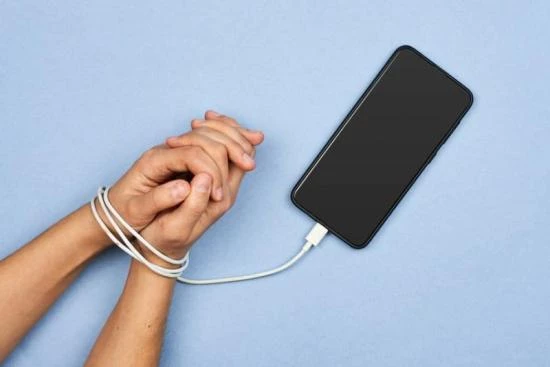Addiction has long been associated with chemical substances such as heroin, cocaine, and alcohol. Today, addictive behavior is not limited to drug addiction. People are developing clinical addictions to their smartphones.
Nomophobia, or technology addiction, is now classified as a clinical disorder requiring treatment in several countries.
Fortunately, as with any other addiction, we at Turquie Santé can direct you to the best hospitals specializing in nomophobia treatment in Turkey.
We're Here to Help.

Nomophobia: The Ultimate Guide
Nomophobia is a relatively new concept that has gained prominence with the increasing use of smartphones. It is characterized by a strong emotional or psychological dependence on mobile devices, to the point where the individual experiences anxiety or distress when separated from their phone.
This addiction, while not involving a drug, has the same effects on the brain. It stimulates the same areas of the brain and affects the reward circuitry in the same way as alcohol, for example.
Common symptoms of nomophobia
Common symptoms of nomophobia, or the fear of being detached from mobile phone connectivity, include:
- Anxiety
- Respiratory alterations
- Trembling
- Perspiration
- Agitation
- Disorientation
- Tachycardia (fast and irregular heartbeat)
These symptoms can occur at any time, even when the person is without their mobile phone or when they think about being without it. The fear must be persistent, excessive, and unreasonable. People with nomophobia may experience panic attacks if they are without their mobile phones, and their symptoms can vary in intensity and frequency.
If you experience any of these symptoms, it's important to see a mental health professional. Nomophobia can be a serious disorder that can have a negative impact on your daily life.
Nomophobia test in Türkiye
N° | Déclaration | 1 | 2 | 3 | 4 | 5 |
1 | I feel anxious when my phone is out of my reach. | |||||
2 | I panic if I can't use my phone. | |||||
3 | I check my phone frequently even if there are no notifications. | |||||
4 | It's hard for me to concentrate on a task when my phone is there. | |||||
5 | I feel uncomfortable if I can't check my phone regularly. | |||||
6 | The thought of not being able to use my phone makes me feel isolated. | |||||
7 | I worry about missing important calls, messages, or e-mails. | |||||
8 | I prefer to have my phone even in social situations. | |||||
9 | The absence of my phone makes me feel disconnected from the world. | |||||
10 | I feel the constant need to update my status on social networks. |
Scoring of the test
Give yourself one point for each answer that best describes you.
- 5: All the time
- 4: Frequently
- 3: Sometimes
- 2: Rarely
- 1: Never
Interpretation of results
- 0–20 points: You are probably not nomophobic.
- 21–40 points: You have moderate symptoms of nomophobia.
- 41–60 points: You have symptoms of severe nomophobia.
This test can be used as a self-assessment tool to identify certain behaviors or thoughts associated with nomophobia. It's important to note that this is not a medical diagnosis, but simply an indicator that could signal a potential cell phone addiction. If someone feels strongly disturbed by these symptoms, it is recommended that they consult a mental health professional for further assessment.
Treatment strategies for Nomophobia in Türkiye
Overcoming nomophobia requires a multifaceted approach that addresses both the psychological and behavioral aspects of smartphone addiction.
The most effective treatments for nomophobia in Türkiye include:
- Exposure therapy: Also known as systematic desensitization, this therapy involves gradually exposing the person to their fear, in this case being without a cell phone, to help them overcome their anxiety.
- Cognitive Behavioral Therapy (CBT): CBT can help address the fears and beliefs underlying the phobia and improve self-esteem. It may also include exposure therapy as part of its approach.
- Relaxation techniques: Breathing exercises, meditation, and other relaxation techniques can help people cope with the fear of not having a cell phone.
- Lifestyle changes: Improving sleep, reducing stress, maintaining a healthy diet, and engaging in physical activity can help manage the symptoms of nomophobia and reduce its impact on daily life.
Medication is generally not prescribed as the only treatment option for nomophobia in Turkey. However, if a person suffers from anxiety or another mental health problem in addition to nomophobia, medication may be recommended. In some cases, tranylcypromine and clonazepam, medications generally formulated for anxiety disorders, have been used successfully to treat the symptoms of nomophobia.
It is important to consult a doctor or psychologist in Turkey before making any treatment decisions.
Share this page
The three terms are related to each other:
- Cyber addiction is the addiction to devices and functions linked to the Internet (social networks, virtual assistants, online shopping, information search ... and);
- Technology addiction concerns addiction to video games, smartphones, tablets, computers and IT in general;
- Nomophobia or adikphonia is phone addiction or the fear of losing your smartphone.
To decrease your child's dependence on technology, here's what you can do:
- Avoid using your smartphone or tablet in front of him;
- Limit its connection time (turn off Wi-Fi if necessary);
- Enroll him in an extra-curricular activity, such as sports, singing or theater;
- Seek help from a specialist when needed.
The price is affordable, however, it differs depending on the patient's profile and the duration of his stay.
